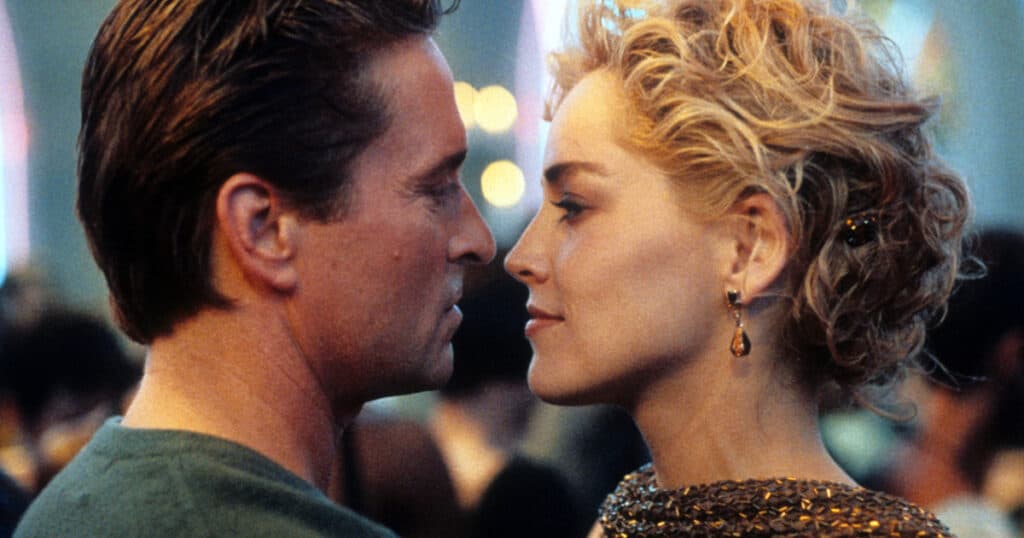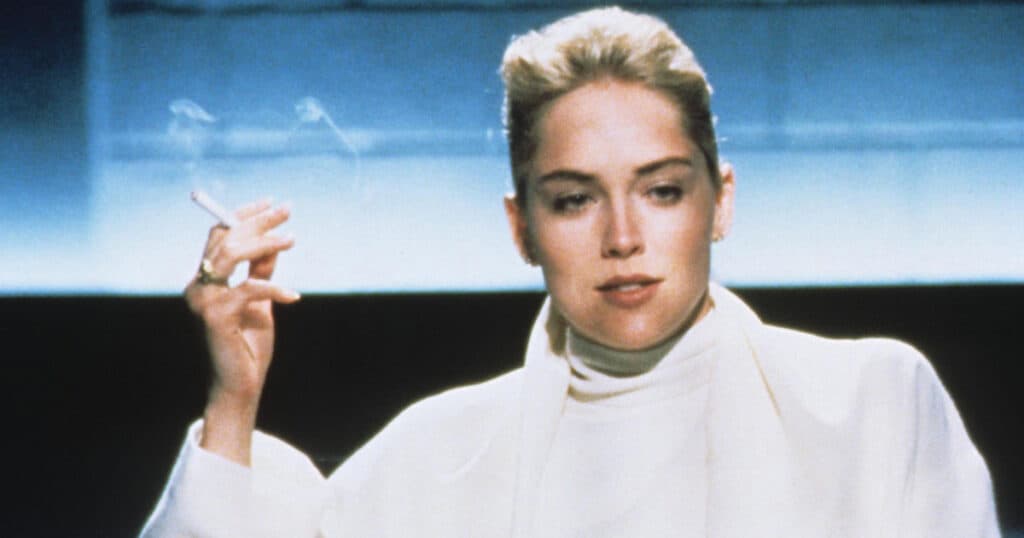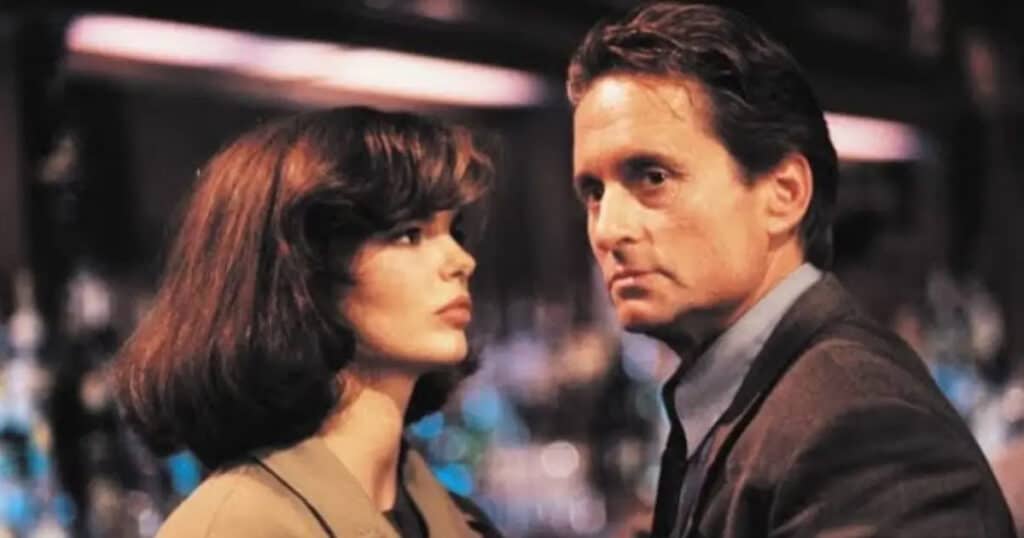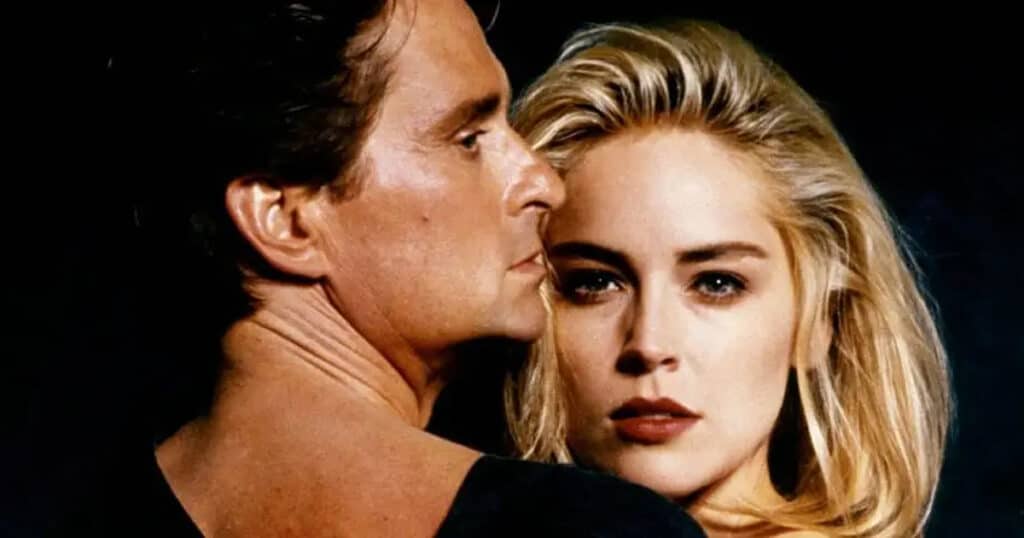
The story of Basic Instinct begins with the writer, Joe Eszterhas. At the time, he was one of the most successful screenwriters in Hollywood, known for writing provocative films like Flashdance, Jagged Edge and Betrayed. Eszterhas had written three movies in a row where his male lead had emotionally manipulated the woman who loved him, so the writer wanted to flip the dynamic, to write a thriller where an evil woman controlled a man effortlessly through mind games and sex. He was fascinated and frightened by the notions of thrill killings and homicidal impulses, and delved into writing the thriller, a combination film noir and detective mystery. Three weeks later, he was done, a script he called “Love Hurts” until changing the title to Basic Instinct the day he sent it to his agent.
His agent was knocked out by it, and soon enough they were holding an auction for every major studio in Hollywood. When the smoke cleared, the script was purchased by Carolco Pictures for a record $3 million, which bested the previous screenplay-sale record holder, Shane Black’s The Last Boy Scout, by over a million bucks. Carolco was known for big budget action pictures like the Rambo films and Total Recall, and though they were having some financial difficulties at the time thanks to overspending on talent, the principals at the company felt Basic Instinct was a surefire hit.
Another million went to Eszterhas’ preferred producer, Irwin Winkler, the legendary producer behind hits like Rocky, Raging Bull, and Goodfellas. Together, they were going to court Oscar-winning One Flew Over the Cuckoo’s Nest helmer Milos Forman to direct, but Carolco went over their heads and signed Paul Verhoeven, the intense Dutch director with whom they’d just collaborated on Total Recall. In addition, they signed Michael Douglas to star as detective Nick Curran without consulting Eszterhas or Winkler. Douglas got a $15 million paycheck, the most for an actor in Hollywood history at that time.
Resigned to their new collaborators, Eszterhas and Winkler met with Verhoeven and Douglas to discuss the project, and it immediately became clear to the writer than neither his new director or star particularly liked the script. Verhoeven wanted to know what it was about – really about – and was not satisfied with Eszterhas’ response that it was about psychological and sexual manipulation.
For his part, Douglas seemed particularly concerned, even preoccupied, with the question of redemption. Does his character find redemption after all the sordid business he’s been a part of? During an early meeting with Eszterhas, Douglas kept bringing it up: “What is the redemption here? You can’t do a picture where evil triumphs at the end.” Eszterhas later claimed Douglas wanted the movie to end with Nick shooting and killing Catherine, thus delivering some kind of redemption.
Even after the film was made and about to be released, Douglas was still looking for answers, saying to the NY Times, quote, “I still haven’t resolved the message of this film in my mind. I swear I haven’t. Some of it has to do with redemption…” Douglas really wanted that redemption…
Verhoeven had listed a series of changes he wanted to make to the script, suggestions Eszterhas was not on board with. One of his main ideas was that the film should be sexually explicit, whereas Eszterhas had viewed the film as more subtle, filled with mystery and sexiness but nowhere near the softcore porn Verhoeven was describing, filled with full frontal nudity. The meeting ended badly, with writer and director yelling at each other, culminating in Verhoeven storming out of Winkler’s house with the producer calling him a “nazi” as he left.
Obviously, this was not a good start to the project. Eszterhas refused to make the many changes Verhoeven wanted. Despite the huge payday he received, he felt it was his duty as a writer to stand up for his work. The only thing he and Winkler could do was withdraw from the project, hope Carolco would give it back to them so they could start anew. But of course, the studio was adamant that it was their property now and refused. Eszterhas issued a public statement that basically said he could not work with Verhoeven and that he fundamentally disagreed with the director’s vision for the project. Carolco considered suing Eszterhas for “publicly injuring” the film’s reputation before it even went before cameras. “Basic Instinct” was becoming notorious within the industry before anyone even knew what it was about.
Verhoeven went off with Gary Goldman, whom he’d worked with on Total Recall, to come up with a draft that more accurately reflected the director’s lurid vision for the film, but after doing a few drafts they realized Eszterhas’ original script was the right one after all. Verhoeven sent Eszterhas a copy of the final shooting script, and the writer was shocked to find it was his original version word for word. The director, never known for humility, admitted to Eszterhas that he was wrong, that the script he’d signed to do was “genius” as he put it, and the two made public amends. Unfortunately for Winkler, he was not welcomed back to the production, as Verhoeven wanted to use his own producer, Alan Marshall.

Now the time came to cast the female lead of the film: Catherine Trammell, a sly, remorseless killer who writes books about the people she murders. Naturally, the script went out to some of the biggest names in town: Michelle Pfeiffer, Kim Basinger, Geena Davis, Ellen Barkin and Julia Roberts – just to name a handful – were considered for the role, but they all turned it down, apparently put off by the steamy material – and perhaps by Verhoeven himself. The actress who wanted it more than anyone was Sharon Stone, who’d made a series of forgettable B movies in the 80s before standing out as Arnold Schwarzenegger’s duplicitous wife in Verhoeven’s “Total Recall.” Stone auditioned for the part several times, and while Verhoeven thought she was right for the part, the studio was hesitant to cast a virtual unknown in the crucial role of the villain. Michael Douglas was unsure as well; he felt that he needed a name as big as his to share the risks of the film, otherwise it would all be on him. Eventually, they gave in, giving Stone the part that would make her a star. About her, Verhoeven would say, “Sharon is evil,” maybe only half-jokingly. One main condition Verhoeven had for Stone: she had to do everything he asked of her. She agreed, and production was set to commence in San Francisco.
But if the film seemed like it was finally ready to get going with controversy in the past, it had another thing coming. The script got out and caused some ripples in San Francisco’s gay community, especially after gossip columnist Liz Smith had written a column saying Basic Instinct was about, quote, “ice-pick wielding lesbians.” Not ideal, obviously. A group of prominent gay community leaders wanted to have a sit-down with Verhoeven and Eszterhas in order to put to rest their fears that the film was going to be “anti-gay.” To his credit, Eszterhas had no problem with the idea: he knew he didn’t write a film about an evil lesbian, as Catherine was bisexual and, as he saw it, she was turned on by mind games and seduction, not sex. Verhoeven, however, was initially unwilling to meet with the community, thinking they were trying to censor him and stifle his creativity as an artist. After some back and forth, the director agreed to meet with them to allay their worries.
Of course, Verhoeven’s style is not what most people would consider delicate, and he quickly made it clear to a roomful of concerned gay people that he was not going to alter a word of the script. Eszterhas was more understanding, said he would look at the script and make it even clearer that Basic Instinct would in no way be an attack on their community. The meeting basically ended on a stalemate, with the rare occurrence of a director vowing not to change one iota of the screenplay even while the writer was open to tinkering with it. With production about to commence, it became obvious that Basic Instinct would be getting lots of unwanted publicity in the Bay Area from protestors.

And protest they did, in exceedingly intrusive ways. They blow whistles and flash lights in the cameras; they’d chant loudly and do anything they could to hold up production. Some of them held up signs encouraging passing cars to “honk if they loved the 49ers,” which of course prompted native San Franciscans to joyously make noise for their beloved football team. The facade of a bar where a scene was being shot was doused with paint, stopping the day’s work in its tracks. Verhoeven’s producer Alan Marshall took to performing “citizen’s arrests” and hauling out protestors singlehandedly, which made him the very unpopular face of the production and the target of most of their ire. The production released an official statement that read, “Censorship by street action will not be tolerated.”
But protestors weren’t the only ones bringing the heat. Conflicts on set between Douglas and Stone were apparently a regular occurrence. Douglas, it seemed, didn’t like the fact that Stone’s character was constantly outwitting and manipulating his character, and he would change the dialog to make Nick seem less weak compared to Catherine. “She one-ups me every time” was Douglas’ complaint. One particularly fraught occasion saw Douglas refusing to walk over to Catherine, the actor instead insisting she come to him. Stone, of course, thought Catherine should be dictating their relationship at all times, not willing to give an inch. A frustrated Verhoeven agreed to shoot it both ways after hours of childish debate.
And probably to no one’s surprise, Verhoeven also had his share of conflicts with his actors. In Eszterhas’ book “Hollywood Animal,” the writer recaps a brief incident where Verhoeven had to go to the hospital with a very bad nose bleed. Eszterhas’ “spies” on set alleged Michael Douglas punched the director, although Paul would deny it, saying he was prone to frequent nose bleeds.
And tension was bubbling between Verhoeven and his lead actress as well. In an April 1992 interview that took place right after the film came out, Verhoeven refers to Stone as difficult, albeit “likably difficult.” He also said it was a love-hate relationship between he and Stone, to which Stone retorted, “Yeah, he loves me, I hate him.” In the same article, Douglas referred to whatever was going on between Verheoven and Stone as a strange “soap opera” and called Verhoeven a “wacko Dutchman.”
Obviously, all this tension on set would make the movie’s notorious sex scenes rather interesting to film. During the first intimate sequence between Nick and Catherine, no stunt – or sex – doubles were used, and the shooting took five steamy days to complete, with Verhoeven meticulously mapping out every shot and body movement. Because the act looked so passionate in the final product, Douglas felt compelled to tell Entertainment Weekly that he swore on the Bible and his son’s life that he and Stone were never actually intimate.
Then there’s the film’s most infamous scene, you know the one. Catherine is in a room filled with cops and lawyers and cooly and effortlessly plays them for fools, simultaneously arousing and confounding them. One crucial moment sees her uncross and cross her legs, giving Wayne Knight – and the entire world – a peek under her dress, a two-second glimpse that would set the world on fire when the movie came out. For the record, this was not in Eszterhas’ script; it was all Paul. Not surprising, is it?
There are really only two versions of how this moment came to pass: Verhoeven’s and Stone’s. The actress claims she was completely blindsided by the revealing shot the first time she saw it on the big screen. Stone claims Verhoeven asked her to take off her white underwear because they were reflecting the light, and the camera would only catch a very vague hint of her crotch area. After seeing the scene in all its glory at a screening, Stone went to the projection booth where Verhoeven was watching the film, slapped him in the face, and left.

Verhoeven has always claimed Stone knew exactly what was happening, saying in an interview any actress would know what we’d be seeing considering where the camera was placed. He felt that only after Stone saw the scene surrounded by agents and publicists was she outraged by it, forcing her to ask him to remove the shot, which of course he would not do. In her autobiography, Stone said she ultimately chose not to pursue legal action against Verhoeven because she knew the shot was correct for the movie and for the character, but noted that while there are many points of view as to what exactly happened with the notorious glimpse, the other points of view are bullsh*t as she is, quote, “the one with the vagina.”
In a sad twist, Stone later revealed that the scene cost her custody of her child. The actress described a judge asking her son if he knew his mother made “sex movies,” apparently landing on the conclusion that she was unfit to act as his mother after showing off her privates in the film. If indeed true, this lends an entirely new and regrettable dimension to the he-said/she-said debate between actress and director.
Strangely enough, the startling reveal would not be a problem for the MPAA, but they certainly had problems with several other shots in the film, not just of the sexual variety, but moments of bloody violence as well. Verhoeven had to re-edit the film approximately eight times before getting an R rating, losing about 40 seconds of film in the process. Those 40 seconds were eventually added to the director’s cut for home video.
With the film in releasable shape, it was time to show the world what all the fuss was about. Basic Instinct was released in March of 1992 – unsurprisingly, the protests started up just as naturally as if they’d never gone away. Outside of theaters, one could hear frustrated members of the gay community shout “Catherine Did It,” which they hoped would spoil the identity of the killer, thus eliminating interest in the film.
This tactic did not work. Basic Instinct made $15 million during its opening weekend, a very nice sum back in those days, and went on to gross $117 domestic and almost $400 million worldwide. While critics were lukewarm on the film, there was no denying that it benefitted from the endless publicity and controversy; it was just a movie you had to go see for yourself. And Sharon Stone became an immediate sensation, all those years of trying for a big break finally paying off, although maybe not in the exact fashion she had imagined.
For his part, Eszterhas wasn’t even invited to the premiere of his own movie, so mad at him were Verhoeven and the producers for his willingness to compromise for the gay community. He had to buy his own ticket opening night; we’re pretty sure he had no problem paying for it… He ended up liking the end result, agreed that it wasn’t malicious or offensive to any one group, and sent Verhoeven a case of champagne as a peace offering. A couple years later, the two would get together for another movie revolving around sex and seduction, Showgirls, which was, let’s say, not nearly as successful as Basic Instinct, though at this point it might be the more notorious and relevant movie.
Finally, there was a Basic Instinct sequel released 14 years later, a movie neither successful nor relevant. It’s only notable for some of the behind-the-scenes drama that occurred before and during its production, which should come as no surprise. Catherine Trammell seems to cause trouble everywhere she goes.
Originally published at https://www.joblo.com/wtf-happened-to-basic-instinct/


